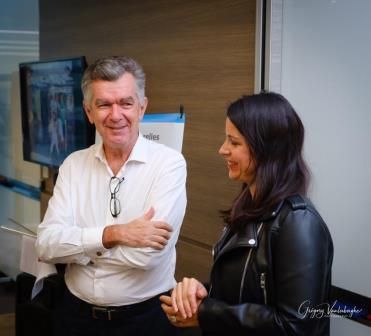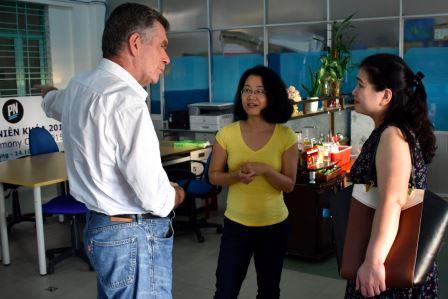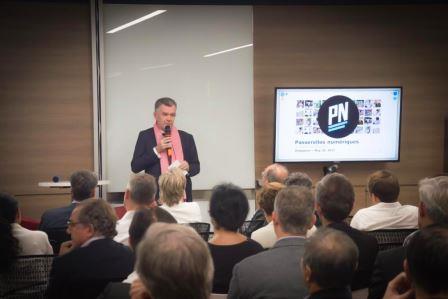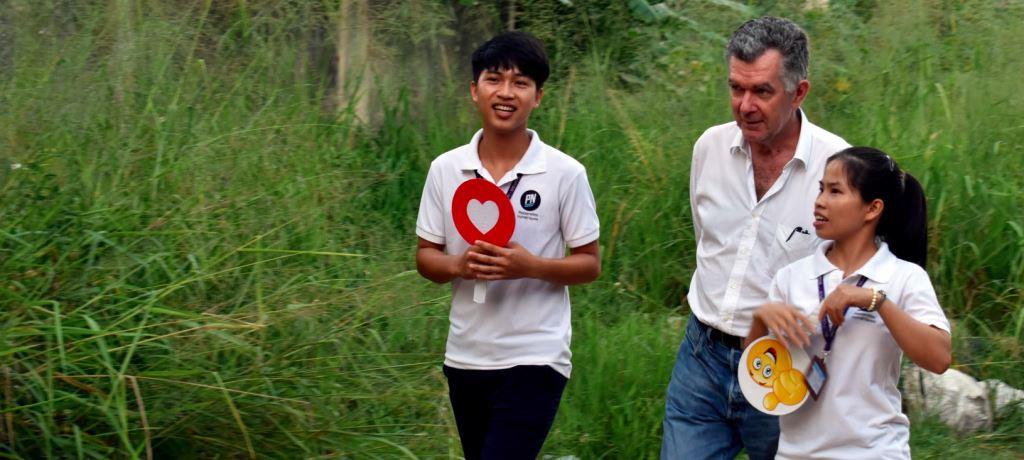Pascal Lambert leads Societe Generale in South East Asia and India. He is based in Singapore and has been working with us since 2013, first as a partner and, then more on a personal level, becoming in 2016 an official board member of the PN organization in Singapore. We spoke with the energetic, talented yet humble man and discovered his career, his role, his vision of Passerelles numériques’ mission.
By Anne-Isabelle de Gentile, PN Asia External Relations & Development Manager
To begin, could you tell us more about your career and how it has brought you to Asia and Singapore?
It may be long (laughs).
I was born and educated in France, in Toulon, then in Paris. I graduated from ESSEC in 1980 and quickly felt the need to go abroad, especially in Asia because of my family’s deep history in this part of the world. My grandfather was in the French public administration in Indochina, my mother was born in Vietnam (Nam Dinh) while my father worked as a colonial administrator between Vietnam, Cambodia and Indochina between 1935 and 1947 and thus living the whole period of the Second World War in Asia.
Anecdotally, my mother is a good friend of the Queen Monique of Cambodia with whom she is still in contact and I even met her four years ago!
So actually, Asia has always been a choice and a goal for me, even if the path to go there has been quite torturous!
After serving as an international corporate volunteer in Tunisia at the French Embassy, I joined IndoSuez, which was then one of the only banks that assigned young graduates abroad immediately. I spent 4 years in Djibouti, then Mumbai and Tokyo. In 1993 I joined Bear Stearns in Hong Kong where I met my wife. Then I returned back to Europe where I worked in Dublin and London. Afterwards I was called back to Hong Kong for a role as COO for Asia.
A year later, Bear Stearns went bankrupt and was taken over by JP Morgan. In 2009, I joined Societe Generale in Hong Kong before arriving in Singapore in 2012.
I planned to ask you if Asia was a choice based on its quality as a dynamic financial centre, the love you have for its culture or just love …
Well, you see it’s mostly a bit of the last two reasons. And having an Asian wife strengthens even more my links to this part of the world.

Speaking at a conference organized by Passerelles numériques in November 2018 in Singapore
Pascal, I know you have many activities, could you describe them briefly?
I am in charge of Southeast Asia and India for Societe Generale. In this region, our activities are focused exclusively on investment banking. We have about 300 people in Singapore, about 100 in India and also offices in Vietnam, Indonesia, Malaysia, and Thailand.
I have been the President of the French Chamber of Commerce of Singapore for the past two years and french foreign trade advisor as well,
I was a moment on the Board of the Alliance Française but it didn’t seem very reasonable to me to cumulate all these positions, at the risk of not being very effective.
I also recently joined the Advisory Board of Nanyang Business School, which will allow me to develop a more local anchorage with the Singaporean education system,
I played for 4 years, as a guitarist, in a rock band in Singapore: Savoy Truffle, whose last performance took place on April 21st of this year at the Singapore Botanical Garden, looking for a new musical project,
And of course, I’m a Board Member of Passerelles numériques in Singapore (PNSEA).
A question that has been on my mind for a long time and even more now that I hear this long list of roles: How do you do it?
(laughs) Well, first of all, Societe Generale remains my priority.
The secret at work is to find the right balance between delegation and information. What the English would refer to as empowerment. The other key is my ability to take quick decisions. Maybe sometimes too quickly but I dislike long discussions, so I quickly digest information and decide accordingly.
I am always connected and try to respond immediately. It’s undoubtedly also the results of my training in investment banking: 15 years at Bear Stearns has left its mark on me!
For the rest, our two eldest have left home, so I have more time to spare since I no longer spend my weekends driving them to football, chess, music or other activities.

Visit and discussion with the Passerelles numériques team in Vietnam in October 2018
Pascal would you agree to tell us about your background as a man committed to the community?
Actually, It’s finally quite new. I received a Catholic education and was schooled with the Marianists until my bachelor degree. It was by playing for the mass at school that I learned my first guitar chords.
I started to financially support NGOs when I was at Bear Stearns, the bank demanding that a fixed percentage of our emoluments be paid annually to an eligible NGO. And I guess it was as a heritage of my time with the Marianists, that I first supported the Catholic Foreign Missions.
Passerelles numériques came to me as a happy coincidence. Benoît (Editor’s note: Benoît Génuini – President of Passerelles numériques from 2006 to 2018) wanted to submit a project to the Societe Generale Foundation in Paris in 2013 and the PN project was perfectly aligned with the Foundation’s areas of commitment. But to be accepted, a business sponsor was needed on the ground.
What followed was indeed a story of:
– timing: the Foundation called me when we were questioning ourselves, in Singapore, about our Corporate Social Responsibility (CSR) commitment,
– person: Benoît’s meeting proved to be decisive and my connection with him is always very easy as he is a charismatic person.
And that’s how we started our partnership with Vietnam, since we have a presence in the country (Representative Office in Hanoi).
And could you tell us about your first experience in our centre in Vietnam?
Since then, at each of my visits, I am astonished by the joy and the smiles of the young people. Each of them greets me with a smile. It’s extraordinary to see such optimism when one imagines their unprivileged background! This is also what Societe Generale employees share when they come back from their mission on the field. I am also impressed by the commitment of PN teams and volunteers. Their engagement, motivation and involvement call for respect.
What would you say you gain from your commitment?
The satisfaction of knowing , that at my own level, I can make a difference. Finding funds is, of course, crucial for the continuity of PN’s operations. Knowing that when I bring a new financial sponsor, I am helping young people to break the cycle of poverty for themselves and their families is a great fulfilment.

Speaking at a conference organized by Passerelles numériques in May 2017 in Singapore
Would you recommend others to commit?
Absolutely!
At Societe Generale, I always see the satisfaction felt by our teams when they come back from their mission. PN’s skills-based sponsorship is remarkable. As Benoît said, and as Maud repeats too (Maud Lhuillier, Asia Director), it is important that a volunteer who commits himself/herself brings something and gets involved in his/her mission.
This mission meets the needs expressed by the centre, with a recruitment process that ensures that the skills of the volunteer match the needs.
Finally, it is a win-win situation: on the one hand, the company has an employee who has confronted his/her expertise in a new context and comes back motivated and proud of his/her company. On the other, the employee gives meaning to his/her work and of course, PN get access to competencies that they may not have internally.
There is certainly no “voluntourism” at Passerelles numériques: neither walls to repaint nor internship for aimless youth looking for a rewarding line on their resume.
Finally what would you say about PN in a few words?
We sometimes hear that Passerelles numériques doesn’t have the right scale, the right size to attract big donors but, on the other hand, I think this gives it a more tangible dimension.
For my colleagues and I, being able to commit this way, in countries that are very close to us geographically and yet very far in terms of development and the daily reality of our work at Societe Generale, allows us to get some perspectives of the challenges in the region. We realise we can make an impact, even a small one.
If all these impacts add up little by little, reality can change.

